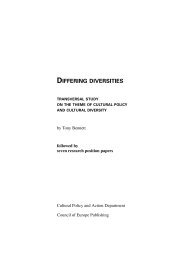Why we need European cultural policies: the impact of EU ...
Why we need European cultural policies: the impact of EU ...
Why we need European cultural policies: the impact of EU ...
Create successful ePaper yourself
Turn your PDF publications into a flip-book with our unique Google optimized e-Paper software.
65 See Annex 1 for a copy <strong>of</strong> <strong>the</strong>questionnaire.66 This is line with Sedelmeier whoindicated that one <strong>of</strong> <strong>the</strong> challenges lies in <strong>the</strong><strong>need</strong> to assess <strong>the</strong> vast policy-making processregardless <strong>of</strong> <strong>the</strong> fact that it is continuouslychanging and developing (Sedelmeier, inWallace and Wallace [eds] [2000]).67 Two slightly different versions <strong>of</strong><strong>the</strong> questionnaire <strong>we</strong>re sent out to <strong>the</strong>respondents in <strong>the</strong> eight new member statesfrom central and eastern Europe and to <strong>the</strong>respondents in Rumania and Bulgaria.68 Eleven respondents included sixresearchers, four public servants and one<strong>cultural</strong> activist.69 This is an opinion shared by severalrespondents.70 Progress reports can be found at <strong>the</strong>EC <strong>we</strong>bsite.71 This is particularly interesting for postsocialistcountries because <strong>the</strong>y have notyet completed <strong>the</strong> process <strong>of</strong> structuralchanges and have barely begun to adjust<strong>the</strong>ir <strong>cultural</strong> markets to <strong>the</strong> new rules <strong>of</strong> <strong>the</strong>market economy (Mucica 2003). Mucicastressed that <strong>the</strong> adjustment <strong>of</strong> existinginstruments regulating culture or draftingnew legislation, which are <strong>the</strong> most importantgoals <strong>of</strong> <strong>the</strong> reform <strong>of</strong> <strong>cultural</strong> sectors, cannotbe assessed without taking into account <strong>the</strong>reform <strong>of</strong> public administration, tax systemsor initiatives for decentralization, whichhave not necessarily been aimed at culture,but have been fundamentally changing <strong>the</strong><strong>cultural</strong> sector. She also emphasized that it isvery difficult, if not impossible, to draw a linebet<strong>we</strong>en <strong>the</strong> changes that are happening inpost-communist countries as a consequence<strong>of</strong> <strong>the</strong> enlargement and those that areconsequences <strong>of</strong> <strong>the</strong> transition to a marketeconomy or adjustments to requests for <strong>the</strong>liberalization <strong>of</strong> trade.72 Negotiations on Chapter 20 <strong>we</strong>reopened bet<strong>we</strong>en 1998 and 2000 and<strong>we</strong>re provisionally closed with most <strong>of</strong> <strong>the</strong>countries in 2002, without any `transitionalarrangements’ (meaning that matters <strong>we</strong>readministered in a straightforward way, and<strong>the</strong>re was no <strong>need</strong> for delay in applyingspecific laws or <strong>policies</strong>).http://europa.eu.int/comm/enlargement/negotiations/chapters/chap20/73 This was not reported by any <strong>of</strong> <strong>the</strong>respondents. Usually this kind <strong>of</strong> assessment/evaluation comes from outside. In this case,it was <strong>the</strong> opinion <strong>of</strong> <strong>the</strong> Commission, whichconstantly stresses that <strong>the</strong> harmonization isan ongoing process.74 Such as: <strong>European</strong> Conventionon Cinematographic Co-production(ETS No.147, 2 October 1992); <strong>the</strong> Fundfor funding co-productions, `Eurimages’(1988), and <strong>the</strong> <strong>European</strong> Convention onTransfrontier Television (ETS No.132, 1998).Progress reports on <strong>the</strong> pre-accessionNotes85














